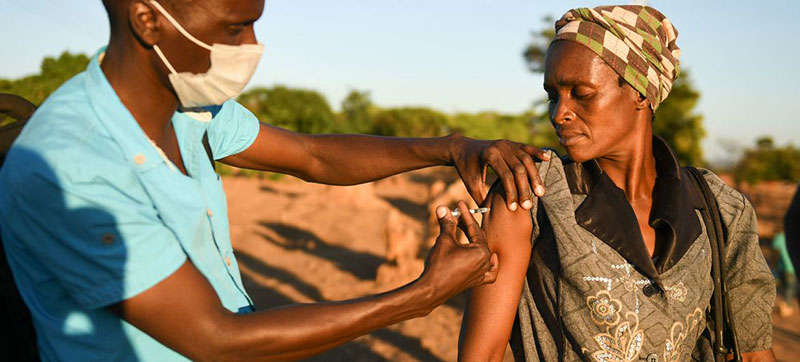 Africa COVID19
Africa COVID19
Africa needs to ramp up COVID-19 vaccination rate six-fold
New York: The COVID-19 vaccination rate in Africa needs to increase six-fold for the continent to meet the 70 per cent target set for the middle of this year, the World Health Organization (WHO) said on Thursday.
Although vaccine supplies have risen significantly, the continent is struggling to expand rollout, with only 11 per cent of the population fully vaccinated.
To date, Africa has received more than 587 million vaccine doses: 58 per cent through the UN-backed and equity-based COVAX Facility, 36 per cent through bilateral deals, and six per cent through Africa Vaccines Acquisition Trust (AVAT) of the African Union.
“The world has finally heard our calls. Africa is now accessing the vaccines it has demanded for far too long. This is a dose of hope for this year,” said the WHO Regional Director for Africa, Dr. Matshidiso Moeti.
A truck carrying Covid 19 vaccines is unloaded at the airport of Nouakchott, Mauritania., by © UNICEF/Abd El Aziz Mohamed Ko
In January alone, 96 million doses were shipped to Africa, which is more than double that of six months ago. But now the spotlight is on the need to rapidly ramp up vaccine rollout.
Currently, six million people are vaccinated on average every week, and this number needs to increase to 36 million, to reach the 70 per cent target.
New initiative
Together with UNICEF, the International Federation of Red Cross and Red Crescent Societies (IFRC), and other partners, WHO is now launching a new initiative to try and resolve bottlenecks.
The partners are scaling up efforts to overcome hurdles, improve coordination and speed up vaccination drives. They have also called for vaccines to be administered as quickly as possible to avoid vaccines expiring.
Through the partnership, technical experts are being deployed to 20 countries to offer support for three to six months and in some cases up to a year.
Already 50 experts have been deployed, strengthening partner coordination, logistical and financial planning, including microplanning, surveillance of adverse events following immunization, management of data, and vaccine stock.
Current situation
So far, only Mauritius and Seychelles have met the 70 per cent target. Seven other countries have vaccinated around 40 per cent of their population.
Twenty-one countries have fully vaccinated less than 10 per cent, while 16 have vaccinated less than five per cent, and three have fully vaccinated less than two per cent.
According to Mohamed Fall, UNICEF’s Regional Director for Eastern & Southern Africa, the agency “is at the forefront of the largest, most sophisticated ground operation in the history of immunization.”
“And it will take a response of the same magnitude to turn vaccines into vaccinations,” he said, urging richer countries to fund more operational costs.
According to WHO’s data from 40 countries, there is a $1.29 billion gap in funding just to keep up with costs.
Pandemic update
The continent is now emerging from its fourth pandemic wave overall, driven by the Omicron variant, which has been reported in 37 countries.
Cases have declined for the third straight week. Over the past seven days, cases dropped by 15 per cent, while deaths fell slightly, by five per cent.
Despite the overall decline in deaths, North Africa reported a 25 per cent rise.
So far, the continent has recorded 10.8 million cases and over 239,000 deaths.
Support Our Journalism
We cannot do without you.. your contribution supports unbiased journalism
IBNS is not driven by any ism- not wokeism, not racism, not skewed secularism, not hyper right-wing or left liberal ideals, nor by any hardline religious beliefs or hyper nationalism. We want to serve you good old objective news, as they are. We do not judge or preach. We let people decide for themselves. We only try to present factual and well-sourced news.






